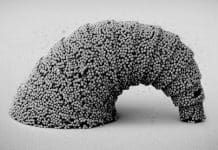Carol Bessel and Melissa Olson from National Science Foundation’s Division of Chemistry (CHE) reveal the organisation’s goal of advancing basic chemical research while also developing a globally competitive workforce
The Division of Chemistry (CHE) at the National Science Foundation is committed to the goal of advancing basic chemical research while also developing a globally competitive workforce. The pursuit of fundamental chemical science, however, is not just bound to the lab. Rather, it serves to address and solve some of the most pressing societal challenges.
CHE actively solicits and funds projects that design and develop sustainable chemistry pathways from synthesis to recycling; advance algorithms and novel qubit structures for quantum computing; accelerate and complement chemical discovery with data mining and artificial intelligence (AI); and seek to understand and engineer the biochemistry governing life processes such as in synthetic biology, epigenetics and studies of the microbiome. Because each of these grand challenges straddles disciplinary lines and national borders, CHE also promotes interdisciplinary and international teams. Any real solution to these grand challenges also requires public support, calling chemists out of the lab to communicate, interact and broaden participation.
Chemistry forms the basis of nearly all consumer products, from the long, messy chains of carbon atoms in plastics, to the atomically precise molecules in pharmaceuticals with chiral structures. While these products prove incredibly useful and sometimes lifesaving, their entire ‘life cycle’, from cradle to grave to cradle, must be considered. The desirable durability of plastics leads to their problematic persistence in the environment, as witnessed in plastic ‘islands’ in the oceans. Aiming to reduce plastics in the environment, CHE funds projects exploring catalysis for novel polymers designed to be chemically or mechanically degraded, biodegraded and/or upcycled into new consumer goods. The atom level precision required in fine chemicals often leads to many-step reactions and purification processes, each consuming energy or generating solvent waste. Creating sustainable synthetic methods, real-time characterisation and facile separations are priorities for CHE. Organic electrosynthesis is an especially opportune area for collaboration, especially with engineering partners such as the Division of Chemical, Bioengineering, Environmental and Transport Systems (CBET) Division at NSF. CHE also hopes to strengthen this field through international partnerships in the future.
While developing sustainable chemistry is imperative, fundamental research underpins all advances. This includes the particle-to-particle and atom-to-atom interactions defined by quantum mechanics. Through Quantum Leap, one of NSF’s Big Ideas to guide the next decade of research, CHE supports research addressing and exploiting a wide variety of quantum phenomena, from spectroscopy with entangled light to controlling electronic spin for molecular qubit design. This work blurs interdisciplinary lines and requires a new approach to workforce development, so CHE partners with eight other NSF divisions for projects such as QISE-NET, which builds ‘Triplets’ between students, academic mentors and industrial mentors and Quantum Leap Challenge Institutes, large-scale interdisciplinary research projects that seek to advance the frontiers of quantum computation, communication, simulation and/or sensing.
While the development of quantum computing harnesses the smallest of phenomena, chemists are also turning to big data. With the generation and assemblage of mass amounts of computational and experimental data, exploration of new chemistries can be guided and accelerated with tools such as data mining, machine learning and cheminformatics. CHE supports the development and application of these tools through the Data-Driven Discovery in Chemistry program and through the Harnessing the Data Revolution Big Idea. These projects touch all fields in chemistry, from the optimization of chemical reactions in microdroplets to the search for protein folding guidelines. These techniques can require programming and statistical analysis that go beyond the bounds of traditional chemistry. To foster new collaborations between mathematicians and chemists, CHE has worked with the Division of Mathematical Sciences to sponsor an Innovation Lab bringing together investigators from both disciplines to innovate and generate new ideas and project proposals.
One of the first, large-scale projects to develop and adopt big data concepts was the Human Genome Project. Sequencing the human genome was a momentous achievement, but it also raised a myriad of additional, interesting scientific questions. Another NSF Big Idea, Understanding the Rules of Life, aims to tackle one of these questions – how to predict phenotype (observable characteristics) from genetic information. CHE plays a significant role in answering this question, especially as it is reduced to molecular interactions and chemical responses. These projects include designing platforms for the study of macromolecules that reproduce the crowded conditions in cells and synthesizing artificial organelles, both of which are co-funded with CBET or the Directorate for Biological Sciences.
While poised to address the scientific aspects of these challenges, chemistry needs an informed and active public to help fund or implement any solution. Every award that CHE makes requires investigators to consider the broader impacts of their work, which includes the impacts on the public. Chemistry encourages investigator efforts aimed at education, for example, Energy and U, a collaboration between the chemistry and theatre departments at the University of Minnesota that teaches students about the laws of thermodynamics. Other investigators develop entirely new media for education, such as 3D printed protein structures to help teach blind students about protein dynamics. CHE also encourages chemists to engage in efforts outside academe, offering support for graduate students to pursue internships in industry or government laboratories.
Though CHE strategically supports the programs and initiatives mentioned above, it continues to support basic chemical research of all kinds. Chemistry remains a powerful tool, both inside of the lab when exploring fundamental phenomena and beyond the lab, improving the world around us.
Carol Bessel
Acting Division Director
Melissa Olson
Presidential Management Fellow
Division of Chemistry (CHE)
National Science Foundation (NSF)
Tel: +1 703 292 5111











